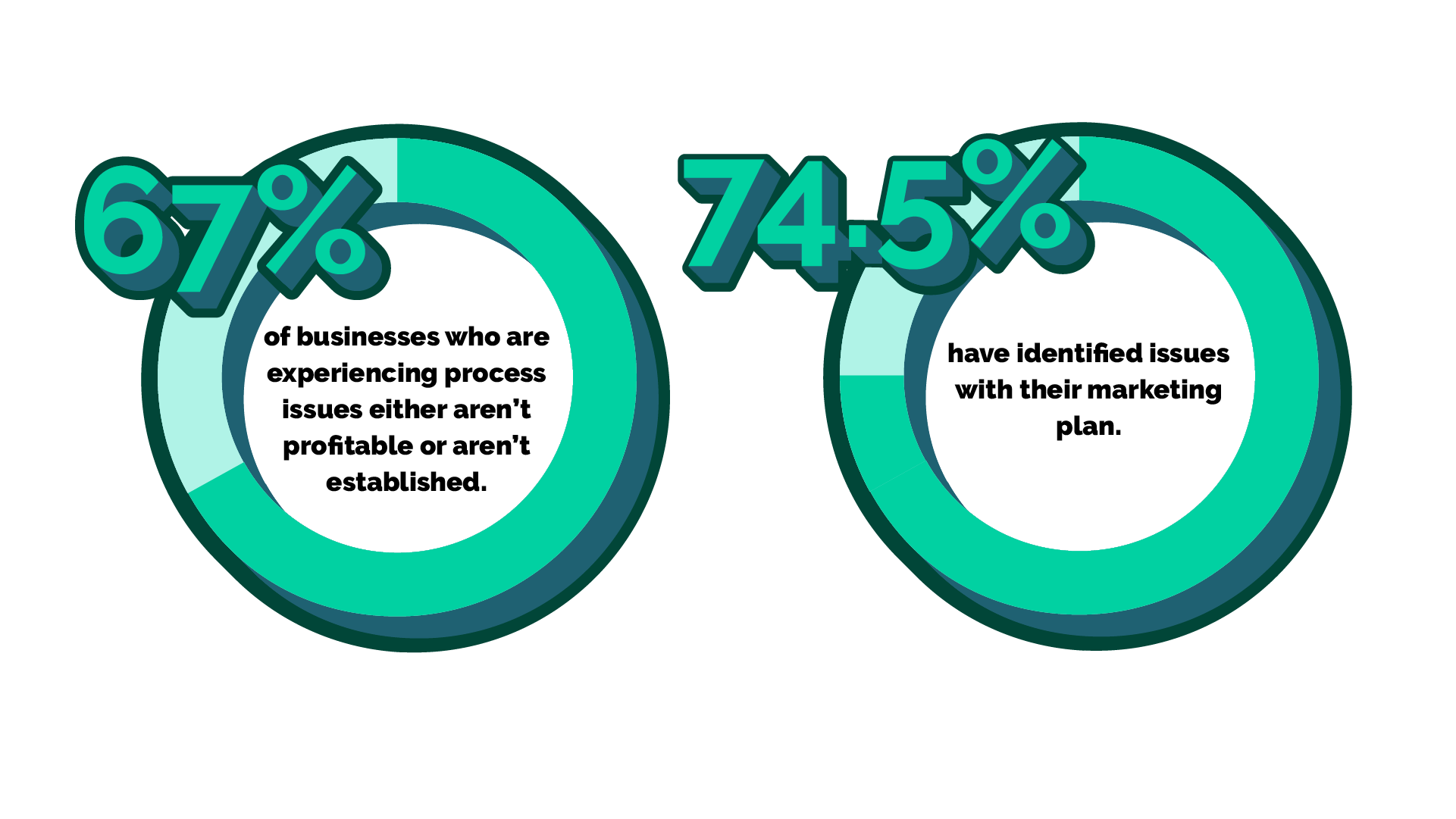Stuck in the early stages of your B2B business? Established, but not yet profitable? Chances are that your internal business processes may be holding you back.
Our B2B marketing survey found that:
52.3% of the B2B businesses we spoke to cited their processes as a key barrier to growth.
49.5% of these businesses also said that they thought their marketing plan wasn’t working.
In other words, effective processes are a key pillar to a good marketing plan.
To succeed and achieve growth, it’s crucial that you build your processes into your marketing plan.
A lack of processes is holding B2B businesses back
There are plenty of ways for a business to fail. Poor cash flow, lack of planning or product fit are common reasons. A failure to connect with customers and a confused marketing strategy is another.
But there is one reason—a common one among B2B businesses—that no one is talking about.
We’re talking about marketing and sales processes.
Or, to be precise, the lack of any processes.
Why do so many B2B businesses have process issues?
In part because no one talks about process.
Why?
 We assume doing so doesn’t quite suit the image conjured up by entrepreneurs who get up at 5am and start their day by quotingThe Art of War for the hundredth time on LinkedIn.
We assume doing so doesn’t quite suit the image conjured up by entrepreneurs who get up at 5am and start their day by quotingThe Art of War for the hundredth time on LinkedIn.
In short, process isn’t sexy.
Process is a pretty dull word. I’m sure we wouldn’t find our bold LinkedIn entrepreneurs as exciting if they spent their time talking about their internal processes.
And yet, not one of them would have seen their B2B business succeed and scale had their processes not been tough as nails. Their success hinges on reliable, consistent, comprehensive process.
Process will be just as fundamental to your success, too.
Why you should see process as a fundamental part to any marketing strategy
Let’s say you are a new B2B business.
You’ve decided to build a marketing strategy focused on solving a common industry problem.
You then decide on a blended strategy incorporating content marketing, SEO and email.
Finally, you setup an email campaign and begin getting some leads. Great start.
But what happens to these leads?
How do you plan on processing them and converting them into customers?
How do you measure your marketing performance to improve future campaigns?
The answers to all of these questions are in your processes.
If you don’t define your processes particularly well, then how will you know exactly what works? Not to mention, by defining processes you will also learn how to be more efficient with each aspect of your business.
This is why processes are so important.
The Invisible Process Hurdle: Has It Tripped You Up?
 On the matter of process, we made two very interesting discoveries with our survey.
On the matter of process, we made two very interesting discoveries with our survey.
Here were the key findings:
Around a 3rd of established business cited processes as a fundamental business issue, no matter if they were profitable or not.
60% of new businesses see their business processes as their key barrier to growth.
This could mean nothing more than that established businesses have had more time to work out any process problems. This would mean that there is a correlation between process and success, instead of a cause and effect relationship.
Given the nature of running a startup B2B business, this is a sensible deduction. In the early stages, it is ideas and enthusiasm that keeps the wheels of your business moving. It’s innovation, a willingness to try something different, and continuous action. After all, businesses that pause don’t tend to get moving again.
To start ups, process might seem like the antithesis of movement. It feels like setting your ways in stone when you’re still trying to figure out what works and what doesn’t. We get it. We’ve all been there.
But our experiences of working with mature businesses often tells us a different story, as most large companies do not align their marketing to their business processes either.
This, we would argue, is a major missed opportunity.
We work with many clients whose main hurdles to success are their processes. It’s not that their processes develop as they grow, but that they can’t grow without fixing processes.
With that in mind, we dug a little deeper into our survey results. And what we found was proof of a cause and effect relationship between process and success.
Process is Fundamental To Success
This led us to our second important discovery. Of the businesses that said they had process issues, 74.5% also said that their marketing plan either:
- Wasn’t working or isn’t getting the expected results
- Wasn’t coordinated (i.e., ad hoc)
- Wasn’t scalable
We don’t think this is a coincidence.
As we’ve already mentioned, there isn’t much in the way of process advice for businesses online. To make matters worse, most marketing advice articles available online either provide generic marketing insights or address specific elements of marketing without consideration for the wider strategy.
In both of these cases, the sentiment “easier said than done” applies.
This is especially true if you don’t have a big budget or team to work with. Ever felt like it all sounds so very simple, and yet you’re getting nowhere with it?
You’re not alone.
Most marketing advice blogs aren’t able to even scratch the surface of B2B business needs.
So where do marketing and sales processes come into all this?
What Do We Mean By ‘Marketing & Sales Processes’?
Before we go any further, here’s a quick explanation of what we mean when we talk about marketing and sales processes.
Processes are everywhere and, in marketing and sales terms, they can be very varied.
There isn’t a single “right” or “wrong” process for marketing and sales. Every business will have a different approach.
But to have a successful business, you must establish clear marketing and sales processes, and ensure that they are effective. Without these processes, you won’t be able to scale your B2B business.
Process is the infrastructure that supports your business when the unexpected happens. It prevents disruption when you take a sick day, when a key team member goes on maternity leave, or when an employee leaves the company.
The trouble is that identifying problematic processes isn’t always straightforward. A dodgy process element might cause a serious problem far into the future, making finding the root cause of the issue difficult.
What Kind of Problems Are Caused By Process Issues?
The simple answer is, all kinds of problems. But let’s get specific.
Let’s say you don’t have an effective process for tracking variable costs as you grow your business. At first, that might not seem like an issue. But 6 months into your marketing campaign those small “harmless” spends have added up. Your bank account balance is looking dangerously small.
As another example, let’s say your business lacks automation processes. Doing everything without automation requires more capacity, increasing your spend. In the case of early-stage businesses, you wind up doing everything yourself and this eats into what little time you have.
Whether its time or money you’re spending, your ROI plummets.
Automation solves this issue. It allows you to reduce time and money spent on menial tasks like:

If you can conceive of it, there’s an automation for it.
Even small process oversights can cause big problems. Imagine your process for onboarding new clients isn’t documented. When you onboard a new client, you neglect to send them your company’s terms and conditions.
Something goes wrong further down the line and your client takes you to court. Having not sent them your terms and conditions, you don’t have much of a leg to stand on. And you can imagine how this example ends.
Experience has shown us that you can trace most issues back to a process problem.
When Murray Dare was first starting out, we too encountered a process hurdle. We thought our process for press releases was robust and reliable. But when we had to handle five press releases at once, it led to a discovery that our process wasn’t scalable. We were inundated and issues started to spring up, causing delays.
Process issues like these are rarely discussed, which is why they’re so common. There is plenty of advice available on almost all areas of marketing, but very little on process.
Our Interpretation Of The Data
 We don’t think it’s a coincidence that 67% of businesses who are experiencing process issues either aren’t profitable or aren’t established. Or that 74.5% have identified issues with their marketing plan.
We don’t think it’s a coincidence that 67% of businesses who are experiencing process issues either aren’t profitable or aren’t established. Or that 74.5% have identified issues with their marketing plan.
Process is not only essential to growth, but problems with process can actually get in the way of it. It can prevent early-stage businesses from ever getting off the ground. And it can keep established businesses from achieving profitability. It’s critical that B2B businesses implement robust processes from the very beginning. This will ensure the long-term success of their company.
So the question is, what process problems or opportunities are lurking in your business?
The Integrity Of Our B2B Business Survey
 If you’re a regular reader of ours, you’ll hear a lot about our B2B business survey in the coming months.
If you’re a regular reader of ours, you’ll hear a lot about our B2B business survey in the coming months.
When we decided to create the survey, we didn’t have any notions about what we would discover. We weren’t on the hunt to confirm ideas we already had, because that’s a surefire way to produce unreliable data.
We’d describe the creation of the survey as an act of curiosity. B2B businesses are our bread and butter, so we wanted to deepen our understanding of how they are faring in the current economic climate.
Before launching the survey, we gave careful thought to how we’d preserve its integrity. Our team reviewed the survey questions to ensure that they weren’t misleading. In the case of this article, for example, we didn’t have any idea that we would be writing on process until we had the results in.
We pushed the survey out to more than 160 B2B businesses, to give us a big enough pool of respondents to work with. Businesses were worldwide, across all industries, and of various sizes and stages of profitability.
View our full B2B survey results.





